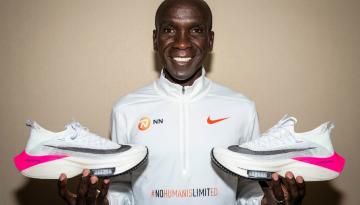
The controversial Nike Vaporfly shoes, worn by both male and female marathon recordholers, will reportedly avoid a blanket ban, when World Athletics hands down its decision later this week.
The Guardian claims the sport's governing body will announce a temporary suspension of any new shoe technology until after the Tokyo Olympics, along with the launch of a comprehensive research project to examine just how advantageous the shoes - and others like them from rival brands - are at elite level.
World Athletics is also likely to introduce a tighter set of regulations for new shoes in the future, including the need for companies to present any prototypes for approval, before they can be used in competition.
Kenya's Eliud Kipchoge wore the Vaporfly, when he broke two hours in a special marathon attempt in Vienna last October, but also holds the official world best at 2h 01m 39s. The next day, compatriot Brigid Kosgei hacked 81 seconds off the women's world record (2h 14m 04s), also wearing the Vaporfly.
In fact, athletes wearing Vaporfly shoes claimed 31 of the 36 podium positions in the six major world marathons in 2019.
The shoes have thick soles and carbon-fibre plates that act like springs to give runners more bounce, and some feel that gives competitors an unfair advantage.
Nike says Vaporfly shoes, which cost about US$250 (NZ$370) and have a lifespan of only about 200 miles, have "a built-in secret weapon that provides a propulsive sensation".
Kipchoge feels the shoes are completely legal.
"I trained hard," he told The Daily Telegraph earlier this month. "Technology is growing and we can't deny it - we must go with technology."
"In Formula One, Pirelli issues the tyres to all the cars, but Mercedes are the best one.
"Why? It's the engine... it's the person.
"It's the person who is running, not the shoe. It's the person driving, not the person making the tyres."
A final decision is expected to be announced on Saturday (NZ time).

